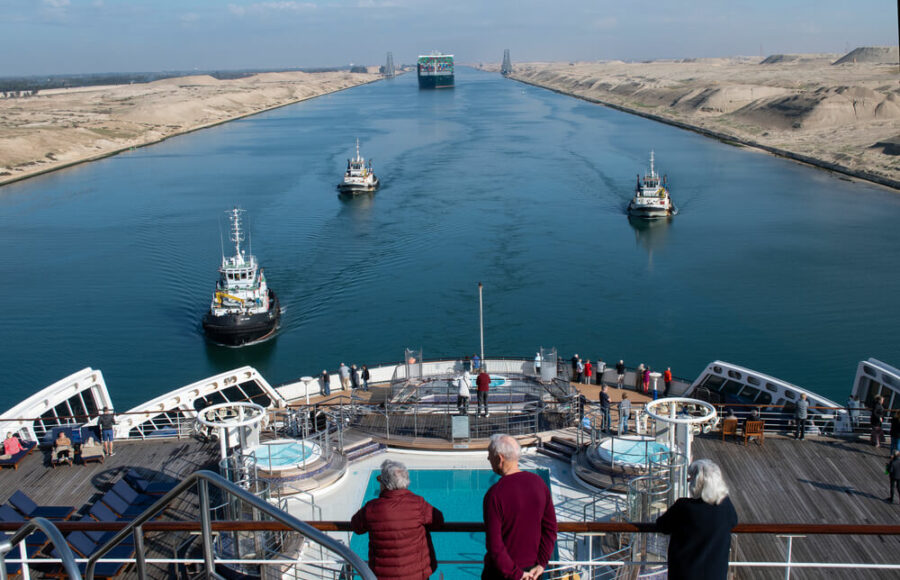Anger is raging on Egyptian streets nowadays, and the reason is parliament’s initial approval of a law submitted by the Egyptian government aimed at establishing a fund owned by the Suez Canal Authority.
The Suez Canal has its own status for Egyptians, being associated with the blood and sweat that their ancestors incurred in digging the canal in 1859. Its nationalization in 1956, considered the mother of all victories, is etched in their memories and in their school curricula. Egypt has fought wars to maintain its sovereignty over this international shipping lane.
Last week, Egypt’s parliament approved in principle new amendments to the Suez Canal Authority law, allowing it to establish an investment fund owned by the authority with a capital of EGP 10 billion.
According to the law, the new fund will be able to buy, sell, rent, lease and exploit fixed and movable assets and benefit from the Suez Canal, which is one of Egypt’s most important sources of foreign currency, in addition to remittances from Egyptians abroad and tourism revenues.
The channel’s revenue was $7.9 billion in 2022, up from $6.8 billion the previous year.
Egypt is suffering from an economic crisis with the outbreak of the Russian-Ukrainian war, which caused a rise in grain prices, which affected the country being one of the largest importers of wheat in the world, and lost a large part of Ukrainian and Russian tourists, who constituted 40 percent of eight million tourists in 2021.
Read: Egypt concludes $14 bn worth of soft financing deals in 2022
Egypt also lost about $20 billion due to the exit of “hot money” from the Egyptian stock market, after the war began.
The Egyptian pound has also deteriorated dramatically by about 57 percent as external debt grows to more than $150 billion and the amount of interest and installments Egypt must pay in the near-term increases.
These developments prompted Egypt to turn to the International Monetary Fund, whose executive board recently approved a $3 billion loan. The IMF said the financial support was granted in exchange for an economic program aimed at “maintaining macroeconomic stability … and paving the way for sustainable, inclusive growth led by the private sector.”
Despite assurances by the head of the Suez Canal Authority, Lieutenant General Osama Rabie, that the proposed fund will receive foreign investors who will not have control over the waterway, with “the canal or any of its assets cannot be wasted,” and that the goal of the fund is to invest “in mega projects,” these statements did not reassure Egyptians.
It seems that the coming period will witness political movements in an attempt to stop the passage of the bill. Note that a number of MPs objected to the amendments made to the draft and saw that its aim was to “sell assets owned by the Suez Canal Authority.”
Some analysts believe that the subject is shrouded in ambiguity, from the first text and phrases of the law to its timing.
The former head of the Suez Canal Authority and current adviser to Egyptian President Abdel Fattah al-Sisi, Lieutenant General Mohab Mamish, had a remarkable position when he said in a statement published by the newspaper “Al-Masry Al-Youm” that the new draft law “is impossible to implement and opens the door to a precedent … It is the presence of foreigners in the management of the Suez Canal who change the system on which it has been based for many years.”
Sisi spoke about the idea of establishing the Suez Canal Authority Fund, and how important it is to have a huge financial solvency for this important place, in a speech during a recent economic conference.
Former Minister of Supply Gouda Abdel Khaleq also pointed out that “the ongoing crisis with regard to the establishment of a special fund for the Suez Canal is the absence of information and data that show citizens the purpose of the inauguration,” pointing out that “the government must disclose the subordination of the new fund and the supervisory authority that will follow up the turnover of its capital and clarify the fund’s board of directors and the roles assigned to it, and whether it will be managed in the same way as the management of the sovereign fund of Egypt, which was established before or not?”
The state of anger expressed by Egyptians through social media prompted the Speaker of the House of Representatives, Counselor Dr. Hanafi Gebali, to declare that the draft law approved by the House of Representatives, which has not completed the final approval procedures, “does not include any provisions affecting the Suez Canal, as it is a public state property, and it is not permissible to dispose of or sell it,” stressing that the state is obligated according to Article 43 of the Constitution – to protect and develop it – and preserve it as an international waterway owned by it, and Committed to the development of the Canal Sector, as an economic center of excellence.
In March, the Suez Canal increased additional transit fees for some categories of ships, mainly crude oil tankers and oil derivatives, to 15 percent, up from 5 percent previously. The decision also included the continued imposition of additional fees on empty tankers at 5 percent of the normal transit fees.
The Canal Authority also raised the additional fees imposed on LPG tankers, chemical tankers, and other liquid materials, to 20 percent of normal transit fees, compared to 10 percent previously.
For more on logistics, click here.








